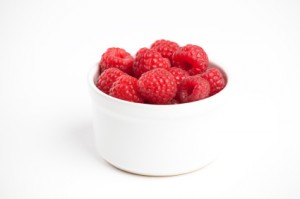 Print This Post
Print This Post
Health Benefits of Raspberries

All types of berries are nutritious and low in calories.
The pigments that give berries their deep colours are also good for your health.
Raspberries are a good source of fibre, potassium, manganese, magnesium, copper, folic acid and vitamins C, E and K. In addition, they contain significant amounts of a phytochemical called ‘ellagic acid’ which may help to prevent some forms of cancer.
Raspberries contain flavonoids – quercetin, kaempferol, and the cyanidin-based molecules called cyanidin-3-glucosylrutinoside and cyanidin-3-rutinoside. These flavonoid molecules are also classified as anthocyanins, and they belong to the group of substances that give raspberries their rich red color and their unique anti-oxidant properties.
Anthocyanins are found in fresh and frozen berries, but not in processed foods – freezing and storing raspberries does not significantly affect their antioxidant activity, although in one study, the freezing process halved their concentration of vitamin C.
Raspberries also contain lutein, which is important for healthy vision (it is purportedly effective at preventing macular degeneration).
Raspberries are one of the most perishable fruits, so care should be taken in their storage and fresh raspberries should ideally be consumed within 2 days of purchasing them.
Nutrition Information for Raspberries
| Nutrition | per 100g | per 75g portion | RDA women | RDA men | RDA child |
|---|---|---|---|---|---|
| Energy | 25 kcal | 19 kcal | 1% | 1% | 1% |
| Protein | 1.4 g | 1.0 g | 2% | 2% | 4% |
| Carbohydrate | 4.6 g | 3.4 g | 2% | 1% | 2% |
| Total Sugars | 4.6 g | 3.4 g | 4% | 3% | 4% |
| Total Fat | 0.3 g | 0.2 g | 0% | 0% | 0% |
| Polyunsaturates | 0.1 g | 0.1 g | |||
| Mono Unsaturates | 0.1 g | 0.1 g | |||
| Saturated Fat | 0.1 g | 0.1 g | 0% | 0% | 0% |
| Fibre | 2.5 g | 1.9 g | 8% | 8% | 13% |
| Salt | 0.0 g | 0.0 g | 0% | 0% | 0% |



 Posted under:
Posted under: